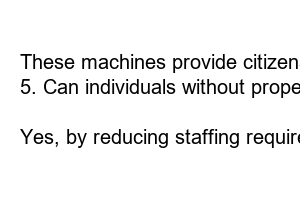무인민원발급기
Title: Revolutionizing Government Services: The Unmanned Civil Service Issuance Machine
Introductory paragraph:
Technology continues to reshape various aspects of our daily lives, with recent advancements increasingly penetrating the public sector. In line with this trend, unmanned civil service issuance machines have emerged as a groundbreaking innovation, streamlining government services and enhancing efficiency. In this blog post, we will delve into the exciting world of these machines and explore their transformative potential for citizens and governments alike.
Subheading 1: What is an Unmanned Civil Service Issuance Machine?
An unmanned civil service issuance machine is an automated system designed to simplify the process of acquiring official documents from government entities. These machines are equipped with advanced technology that allows users to obtain documents such as driver’s licenses, identification cards, birth certificates, and permits quickly and conveniently. By eliminating the need for physical offices and reducing human involvement, these machines provide a hassle-free experience for citizens and optimize resource allocation for governments.
Subheading 2: How Do Unmanned Civil Service Issuance Machines Work?
When utilizing an unmanned civil service issuance machine, users follow a straightforward step-by-step process. They begin by selecting the desired document type and providing the necessary personal information. Next, the machine verifies the provided details by utilizing cutting-edge identity verification technology, such as biometric recognition or RFID scanning. Once the verification process is completed, the machine prints the requested document, ensuring its authenticity and adherence to security standards.
Subheading 3: Benefits for Citizens and Governments
Unmanned civil service issuance machines offer numerous advantages for both citizens and governments. For citizens, these machines eliminate the need to endure long queues, excessive paperwork, and time-consuming procedures. Obtaining essential documents becomes a much more convenient experience, allowing individuals to save valuable time and energy. Additionally, the reduction in physical office visits reduces the risk of exposure to contagious diseases, a particularly significant benefit in today’s global health landscape.
For governments, the implementation of unmanned issuance machines translates into significant cost savings. By reducing staffing requirements and infrastructure expenses, governments can allocate resources to more pressing needs. The machines also help combat corruption and reduce the potential for human error, ensuring a more streamlined, transparent, and accurate issuance process.
Subheading 4: Ensuring Security and Privacy
Amid concerns regarding personal data and security breaches, it is essential to highlight the robust security measures employed by unmanned civil service issuance machines. These machines adhere to strict privacy regulations and employ encryption protocols to safeguard user data. Furthermore, advanced biometric identification technologies and unique access codes ensure that only individuals with proper authorization can access the machines, guaranteeing the safety of sensitive information.
Subheading 5: Implications for Traditional Government Services
The advent of unmanned civil service issuance machines sparks a significant shift in traditional government service provision. While physical offices will still play a role, these machines offer an alternative means of acquiring essential documents, reducing the burden on existing government infrastructure. Moreover, the freeing up of human resources enables government employees to focus on more complex tasks, fostering innovation, and improving overall service quality.
Subheading 6: Future Potential and Expansion
As unmanned civil service issuance machines gain traction, their potential for growth and versatility becomes increasingly evident. Governments can explore expanding their functionalities to include additional services like voter registration, renewing vehicle registrations, or even issuing various licenses or permits. By continuously innovating and improving these machines, governments can amplify their impact and revolutionize the realm of civil service issuance.
Summary:
Unmanned civil service issuance machines represent a game-changing development in the public sector. These automated systems simplify the acquisition of essential government documents, benefiting citizens through convenience, time savings, and reduced exposure to health risks. Governments, on the other hand, experience increased efficiency, reduced costs, and heightened transparency in the provision of services. As these machines evolve, their potential for growth and expansion holds the promise of transforming traditional government service provision. With their many advantages, unmanned civil service issuance machines herald a brighter and more efficient future for citizens and governments alike.
FAQs:
1. Are unmanned civil service issuance machines secure?
Yes, these machines employ robust security measures such as encryption protocols and advanced biometric identification technologies to ensure the safety and privacy of user data.
2. Do unmanned issuance machines entirely replace physical government offices?
No, these machines offer an alternative means of obtaining essential documents but do not eliminate the need for physical offices entirely. However, they help alleviate the burden on existing government infrastructure.
3. Can these machines issue other types of licenses or permits?
While their current functionality centers around issuing official documents like driver’s licenses, identification cards, birth certificates, and permits, the potential for expansion exists, including services like voter registration or renewing vehicle registrations.
4. How do unmanned issuance machines benefit citizens?
These machines provide citizens with a more convenient and streamlined process of obtaining essential documents, saving them valuable time and energy. Additionally, they reduce the risk of exposure to contagious diseases and minimize bureaucratic hurdles.
5. Can individuals without proper authorization access unmanned issuance machines?
No, these machines utilize advanced biometric identification technologies and unique access codes, ensuring that only individuals with the necessary authorization can access and utilize the machines.
6. Are unmanned civil service issuance machines cost-effective for governments?
Yes, by reducing staffing requirements and infrastructure expenses, these machines offer significant cost savings for governments that can be allocated to other important areas. Additionally, they help minimize corruption and human error, ensuring an efficient and transparent issuance process.

